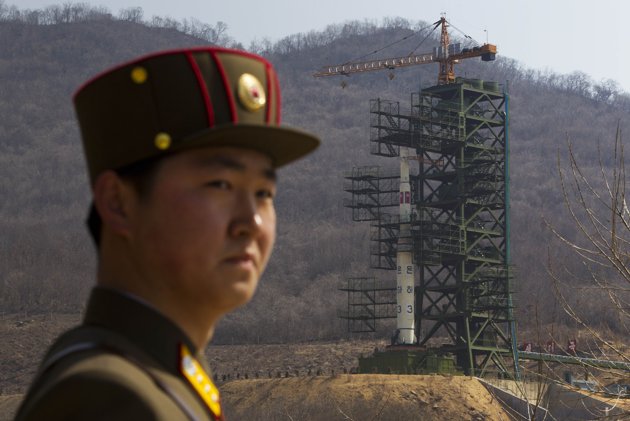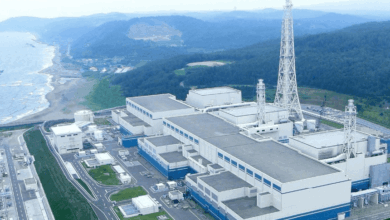
PYONGYANG, North Korea — North Korea's widely condemned rocket splintered into pieces over the Yellow Sea soon after takeoff Friday, an embarrassing end to a launch that Pyongyang had infused with national pride during a week of high-level political meetings and celebrations.
Within minutes of the early morning launch, the United States and South Korea declared it a failure. North Korea acknowledged that hours later in an announcement broadcast on state TV, saying the satellite that the rocket was carrying had been unable to enter into orbit.
World leaders were swift to denounce the launch, calling it a covert test of missile technology and a flagrant violation of international resolutions prohibiting North Korea from developing its nuclear and missile programs.
The rocket's destruction suggests the country has yet to master the technology needed to build long-range missiles that could threaten the United States. Still, worries remain about North Korea's nuclear program amid reports that it may be planning an atomic test soon.
The launch is also a setback for the government of new leader Kim Jong Un, which had projected the satellite as a show of strength amid persistent economic hardship while he solidifies power following the death of his father, longtime leader Kim Jong Il, four months ago.
The foreign ministers of the Group of Eight industrialized nations meeting in Washington, including Russia, condemned the launch. The UN Security Council, meanwhile, scheduled an emergency meeting for later Friday, and Washington said it was suspending plans to contribute food aid to the North in exchange for a rollback of its nuclear programs.
North Korea had announced weeks earlier that it would launch a long-range rocket mounted with an observational satellite, touting it as a major technological achievement to mark the upcoming 100th anniversary of the birth of Kim Il Sung, the country's founder and current leader's grandfather.
"It blows a big hole in the birthday party," said Victor Cha, former director for Asia policy in the US National Security Council. "It's terribly embarrassing for the North."
Experts say the Unha-3 carrier was the same type of rocket that would be used to strike the US and other targets with a long-range missile.
Greg Thielmann, a former intelligence officer with the US State Department, said it now appears the North Koreans haven't mastered the technology they need to control multistage rockets — a key capability if the North is to threaten the United States with intercontinental ballistic missiles.
North Korea has tested two atomic devices but is not yet believed to be able to build a nuclear warhead small enough to be mounted on a long-range missile.
Cha, who was an Asia adviser for former President George W. Bush, said the next step would be to watch whether North Korea conducts a third nuclear test, as has been speculated by the South Korean intelligence community.
State media said the Kwangmyongsong-3 satellite was fired from the Sohae Satellite Launching Station in the hamlet of Tongchang-ri along the west coast but "failed to enter its preset orbit."
"Scientists, technicians and experts are now looking into the cause of the failure," the state-run Korean Central News Agency said.
North Korean space officials said the Unha-3, or Galaxy-3, rocket was meant to send a satellite into orbit to study crops and weather patterns — its third bid to launch a satellite since 1998. Officials had earlier brought foreign journalists to the west coast site to see the rocket and the Kwangmyongsong-3 satellite Sunday in a bid to show its transparency amid accusations of defiance.
The acknowledgment of the rocket's failure — both to the outside world and to North Koreans — was a surprising admission by a government that in the past has kept tight control over information. In Pyongyang, dozens of foreign journalists invited to cover the launch were not allowed to view the liftoff live.
"The failure, which was impossible to hide from the North Korean people given the advance publicity and presence of international media, will be a major source of domestic and international embarrassment for the Kim Jong Un regime," said Ralph Cossa, president of Pacific Forum CSIS, a Hawaii-based think tank.
Attempts to put satellites into orbit often pose problems even for developed nations. In 2010, a South Korean rocket carrying a climate observation satellite exploded 137 seconds into its flight. An earlier 2009 attempt, Seoul's first from its own territory, also failed.
The Unha-3's launch was monitored by a host of US, Japanese and South Korean military assets, which were expected to capture vital data on North Korea's ballistic missile capabilities.
US Navy minesweepers and other ships in the area were expected to begin scouring the seas for debris from the rocket, which can offer evidence of what went wrong and what rocket technology North Korea has.
US Secretary of State Hillary Rodham Clinton, speaking for the Group of Eight, said earlier that all the members of the bloc agreed to be prepared to take further action against North Korea in the Security Council.




